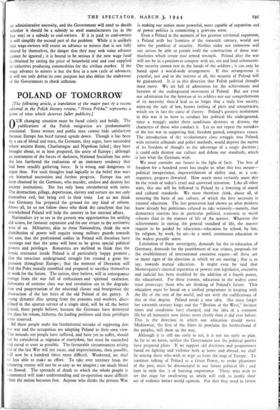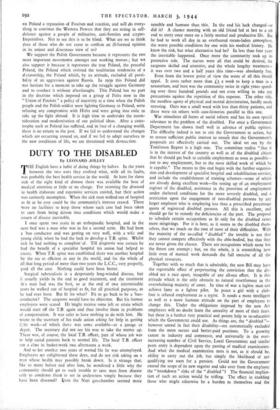POLAND OF TOMORROW
[The following article, a translation of the major part of a recent editorial in the Polish literary review, "Nowa Polska," represents a point of view which deserves fuller publicity.]
IA UR changing situation must be faced calmly and boldly. The publications of the Polish emigration are predominantly emotional. Some writers and public men cannot hide satisfaction
because Europe has heed turned upside down. Though it has been by a sea of blood and tears, the Germans, they argue, have succeeded where ancient Rome, Charlemagne and Napoleon failed ; they have brought about, or at least prepared, the unity of Europe ; although an instrument of the forces of darkness, National Socialism has none the less furthered the realisation of an imminent tendency that had been steadily gathering force. It is wrong and dangerous to argue thus. For such thoughts lead logically to the belief that wars are historical necessities and further progress. Europe has not been cleansed by the Germans, who murder, enslave and destroy her ancient institutions. She has only been encumbered with ruins. The destruction, pillage, deportation, slavery and torture are not only themselves evil, but bring evil in their train. Let us not think that Germany has prepared the ground for any kind of reform. Above all, let us not follow those who think the cataclysm that has overwhelmed Poland will help the country in her internal affairs.
Nationalists try to see in the present war opportunities for settling old scores, for fantastic expansion and for our return to the territories west of us. .Militarists, akin to these Nationalists, think the new distribution of power will require strong military guards towards the east, that the professional soldier in Poland will therefore have openings and that the army will have to be given special political powers and privileges. Romantics are inclined to think that the heroic resistance inside Poland is of particularly happy promise , that the tenacious underground struggle has created a great im- pression throughout Europe ; that the moment of liberation will find the Poles morally ennobled and prepared to sacrifice themselves in work for the future. The nation, they believe, will in consequence emerge from the war full of enthusiasm and spiritual exaltation. Advocates of extreme class war and revolution see in the degrada- tion and pauperisation of the educated classes and bourgeoisie the destruction of the last heirs of the old Poland of the gentry. A young dynamic elite sprung from the peasants and workers, 'disci- plined in the spartan service of a single ideal, will be all the better placed, these people believe, because the Germans have destroyed the class for whom, hitherto, the leading positions and their privileges Were reserved.
All these people make the fundamental mistake of supposing that the war and the occupation are adapting Poland to their own view.
The wounds our people have suffered, and have yet to suffer, should
not be considered as stigmata of martydom, but must be staunched ,,rid cured as soon as possible. The favourable circumstances arising
out of the-last War will not recur, and improvisations, then possible,
will now be a hundred times more difficult. Weakened, we shall he less able to make an effort. To take over territory from the
retreating enemy will not be so easy as we imagine ; too much blood 1,as flowed. The spectacle of death to which the whole people is accustomed will make understanding and co-operation more difficult vhen the nation becomes free. Anyone who thinks the present War
is making our nation more powerful, more capable of expansion and of power politics is committing a grievous error.
Even a Poland at the moment of her greatest territorial expansion, a Poland with her frontiers of the sixteenth century, would not solve the problem of security. Neither today nor tomorrow will our nation be able to permit itself the construction of those war- machines which create true armed strength. Poland after the war will not be in a position to compete with air, sea and land armaments.
Our security cannot rest in the hands of the soldiers ; it can only be based upon a world-wide arrangement. If this arrangement is peaceful, just and in the interest of all, the security of Poland will be guaranteed. It is in this direction that Polish political thought must move. We are full of admiration for the achievement and heroism of the underground movement of Poland. But not even our admiration for the heroism of its soldiers nor our comprehension of its necessity shou'd lead us to forget that a truly free society, enjoying the rule of law, knows nothing of plots and conspiracies, which arc in fact the curse of slavery. Poland's greatest misfortune in this war is to have to conduct her political life underground, since a struggle under these conditions destroys or distorts the characters of those who conduct it. Let us not repeat the mistakes of the last war in supposing that, freedom gained, conspiracy ceases. The introduction of the revolutionary class struggle into Poland, with terrorist tribunals and police methods, would deprive the nation of its freedom of thought to the advantage of a single doctrine ; it could only destroy our culture and debase our standards, which is just what the Germans wish.
We must consider our future in the light of facts. The loss of freedom for a hundred years has taught us .what this loss means— political inexperience, impoverishment of ability and, as a con- sequence, progress thwarted. How much more certainly must this be the result of today's cruel and universal terrorism. Like all other wars, this one will be followed in Poland by a lowering of moral and cultural standards. We must therefore think, above all, of restoring the basis of our culture, of which the first necessity is rational education. The last generation had shown us what thinkers knew already but politicians refused to take seriously—namely, that democracy consists less in particular political, economic or social reforms than in the manner of life of the masses. Whatever the achievements in raising the general standard of life, the masses require to be guided by education—education by school, by law, by religion, by work, by art—in a word, continuous education in the widest possible sense.
Limitation of State sovereignty, demands for the re-education of Germany, demands for the punishment of war crimes, proposals for the establishment of international executive organs—all these are so many signs of the direction in which we are moving ; that is to say, towards mutual education. It might even be said that Montesquicu's classical separation of powers into legislative, executive and judicial has been modified by the addition of a fourth power, the educational. For these reasons, education in the widest sense must preoccupy those who are thinking of Poland's future. This education mpst be based on a unified programme in keeping with the life of the rest of the world, and not with the codifications of this or that dogma. Poland needs a new idea. She must forget her sixteenth century kings and the " Bastion of the West," because times and conditions have changed, and the idea of a common lift for all humanity now shines more clearly than it did ever before. This is the direction in which our education should move. Mickiewicz, the first of the Slays to proclaim the brotherhood of the peoples, will show us the way.
Although it is still too early to act, it is not too early to plan. As far as we know, neither the Government nor the political parties have prepared plans. If we support old doctrines and programmes based on fighting and violence both at home and abroad, we shall be arming those who wish to wipe us from the map of Europe. To continue talking of Poland as a Great Power, to evoke phantoms of the past, must be discouraged in our future political life ; and here in exile this is of burning importance. Those who wish to set the stage for swallowing us whole will seek to justify their act of violence before world opinion. For that they need to fasten
on Poland a reputation of Fascism and reaction, and will do every- thing to convince the Western Powers that they are acting in self- defence against a people of militarists, anti-Semites and crypto- Imperialists. Not to see this is to be blind. What are we to think then of those who do not cease to confirm an ill-formed opinion in its unjust and disastrous view of us?
We support the Polish Government because it represents the two most important movements amongst our working masses ; but we also support it because it represents the true Poland, the peaceful Poland, the Poland which resisted the totalitarian tendencies of a d:ctatorship, the Poland which, by its attitude, excluded all possi- bil:ty of an aggression against Russia. In 1939 this Poland did not hesitate for a moment to take up the struggle against Germany and to conduct it without afterthought. This Poland has no part in the doctrine which imposed on a group of Poles now in the " Union of Patriots " a policy of inactivity at a time when the Polish people and the Polish soldier were fighting Germany in Poland, were refusing any compromise with Hitler and were going into exile to take up the fight abroad. It is high time to undertake the recon- sideration and modernisation of our political ideas. After a catas- trophe such as Poland has suffered, and in face of a changing world, there is no return to the past. If we fail to understand the changes which are occurring around us, and if we fail to adapt ourselves to the new conditions of life, we are threatened with destruction.



























 Previous page
Previous page